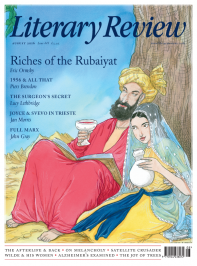James Marriott
There Will Be Blood
The Heavenly Table
By Donald Ray Pollock
Harvill Secker 365pp £12.99
Donald Ray Pollock’s new novel returns to the barren wastes of the Midwestern United States familiar from his previous book, The Devil All the Time, to follow the adventures of the fictional Jewett gang. Set in the middle of the First World War, square between the eras of Billy the Kid and Bonnie and Clyde, the story begins with Pearl Jewett, a crazed old vagrant who is committed to inflicting a life of demented hardship on himself and his sons in the belief that the greater his suffering in this life, the greater his reward will be in the next (especially in the form of the titular, food-laden, heavenly table). When Pearl dies, his bungling sons, Cane (clever), Chimney (lustful) and Cob (a ‘dummy’), set about forging an improbable career as a bloodthirsty outlaw gang, inspired by a trashy thriller called The Life and Times of Bloody Bill Bucket. In the first of many outrageous, hair’s breadth escapes, the brothers manage to blow the head off the oppressive local landowner, steal his horses and head for the open road. The novel is off to a rollicking start.
Despite lacking intellectual power and basic criminal nous, the brothers soon achieve notoriety, bluffing their way through bank robberies and even (semi-accidentally) managing to shoot down the biplane of a passing millionaire. Pollock also introduces us to a gaggle of other characters, including the effete Lieutenant Bovard, a classics-loving graduate

Sign Up to our newsletter
Receive free articles, highlights from the archive, news, details of prizes, and much more.@Lit_Review
Follow Literary Review on Twitter
Twitter Feed
The era of dollar dominance might be coming to an end. But if not the dollar, which currency will be the backbone of the global economic system?
@HowardJDavies weighs up the alternatives.
Howard Davies - Greenbacks Down, First Editions Up
Howard Davies: Greenbacks Down, First Editions Up - Our Dollar, Your Problem: An Insider’s View of Seven Turbulent...
literaryreview.co.uk
Johannes Gutenberg cut corners at every turn when putting together his bible. How, then, did his creation achieve such renown?
@JosephHone_ investigates.
Joseph Hone - Start the Presses!
Joseph Hone: Start the Presses! - Johannes Gutenberg: A Biography in Books by Eric Marshall White
literaryreview.co.uk
Convinced of her own brilliance, Gertrude Stein wished to be ‘as popular as Gilbert and Sullivan’ and laboured tirelessly to ensure that her celebrity would outlive her.
@sophieolive examines the real Stein.
Sophie Oliver - The Once & Future Genius
Sophie Oliver: The Once & Future Genius - Gertrude Stein: An Afterlife by Francesca Wade
literaryreview.co.uk